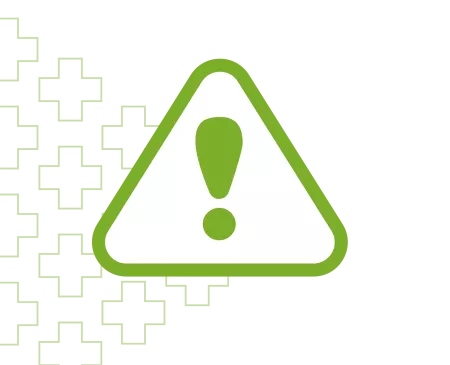WHY?
The only thing worse than getting cited during a hospital survey is getting cited for your own polices. Consider the time you spend on survey preparedness: pouring through all of the newest regulatory updates, spending countless hours interviewing staff, and ensuring that hospital policies are updated and accessible. And then…
Beware of the self-inflicted wound
The day finally arrives. A team of surveyors appears at the main entrance. The war room is established in record time, document requests are made, and the survey teams deploy.
After a quick debrief with the survey team, you’re disheartened to learn that you’re being cited—but not because you failed to follow a regulatory standard. Instead, you’re cited because of your policy content and failure to follow your overly stringent policy requirements.
WHY NOW
With COVID restrictions easing up, we’re seeing a renewed effort by The Joint Commission (TJC), the Centers for Medicare & Medicaid Services (CMS), and state agencies to get back on track with their survey processes.
Understandably, most hospitals across the nation transitioned into crisis mode during the COVID surge, and policy maintenance was likely low on their list of priorities. However, we all know that you will still be held to those policy requirements during your upcoming survey no matter how many times you say, “But COVID…….”
COVID isn’t an excuse
While I understand how painful it may be for hospital executives to hear this, it bears repeating: You can’t keep using COVID as an excuse.
As much as we don’t like being the bearer of bad news, we’re hearing this more and more from regulatory agencies. While they understand how the pandemic ravaged healthcare facilities, they also understand the need to have policies that ensure ongoing patient safety and promote quality care within the hospital.
WHAT
While many hospitals continue to deal with crisis staffing, it’s more important than ever to ensure policies, procedures, and guidelines are updated, easy to access, simple to read, and match practice.
Keeping it simple helps avoid policy management failure
As an ICU nurse for many years, the only policies I wanted to read were short, sweet, and to the point. I was always tempted to send any policy over five pages to the recycle bin and just ask a coworker, “how am I supposed to do this?”
Hospitals consistently develop excessively long and overly stringent policies that staff members simply can’t follow. Below are several common struggles with policy development, plus examples, that could lead to self-inflicted citations during a survey:
- Regulation myth is pervasive… “The last surveyor said”: An overly zealous surveyor prefers you document a care plan progress note (in addition to your care plan) at the end of each shift in the name of “best practice.”
- Over-interpreting regulatory requirements: We should screen EVERY patient that walks in the door for suicide, instead of following the actual regulations (NPSG 15.01.01, EP 2).
- The “Kitchen Sink” Methodology – “While we’re at it”: Nursing is at the bedside 24/7 so we can have them perform screening on every admission (nutrition, discharge planning, rehab, you name it).
- Thinking if we require it in policy, it will drive practice: If I say in policy that a nurse will document hourly rounding, that will force them to round each hour, correct?
- Believing MORE will somehow protect us: If I develop a 30-page restraint policy and drop in all the regulations (verbatim) with definitions for good measure, surely that will protect me from a lawsuit?
- No path from expectation to operational reality: We will require that pain be re-assessed and documented exactly 30 minutes after each pain intervention.
- Not aligning policy, practice, and EMR: To make it easier for staff, we state in policy that Flowsheet SUI89X7 will be documented each time a patient is placed in suicide precautions (but that form hasn’t existed in three years).
These examples of policy issues can result in citations—not from a regulatory failure, but from a policy management failure. It’s easy to identify the back-end failures of policies (e.g., staff didn’t follow policy).
But as we can see from the front-end issues listed above, addressing the policy-development process is vital to avoiding common sources of non-compliance.
IMPACT
Beware and be ready for “the top five”
Policies that pose the greatest vulnerability deal with key clinical issues: suicide, restraint, informed consent, titrations, care planning, and pain management. Suicide Management and Medication Management were named in the top five list as the “most non-compliant” requirements by TJC for 2020. Because these issues are especially vulnerable, it’s critical that the relevant policies are streamlined and concise—while providing clear staff directives that meet the intent of the regulations without adding unnecessary requirements
There’s no question that these policies and processes will be reviewed during survey. The more important question is, has your hospital provided staff with policies that will ensure successful survey outcomes?
TAKEAWAYS
Survey teams are coming. Are your policies ready?
Hospitals should evaluate current policy development practices and ask some key questions:
- Is this policy worthy? Should this just be education or a guideline?
- Does this meet the intent of the regulation? Am I adding unnecessary requirements?
- Who is my audience? The nurse at the bedside or a surveyor?
- Are these expectations realistic, and can they be operationalized?
- Does this policy already exist?
- Does policy match practice?
Countless tips and tricks can help hospitals streamline their policy management processes, but at a minimum, we must ensure that we aren’t setting staff up for failure with policy language and content.
Don’t let your policy development be a gap in your survey-preparedness process.
© 2024 Greeley. All rights reserved. This content draws on the research and experience of Chartis consultants and other sources. It is for general information purposes only and should not be used as a substitute for consultation with professional advisors. It does not constitute legal advice.

Receive a CMS Adverse Action Notice? We can help!
If you need immediate assistance responding to regulatory and accreditation activity, please contact us today. Chartis Clinical Quality Solutions brings unmatched expertise helping clients develop Plans of Correction to address threats to accreditation or certification.

